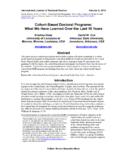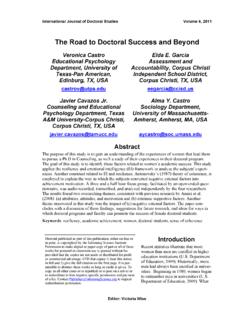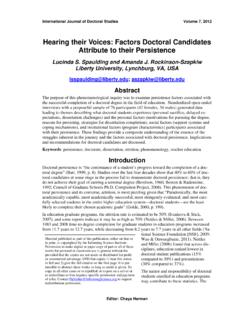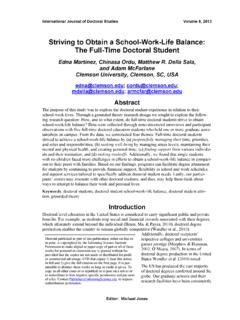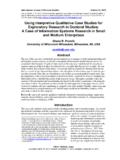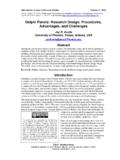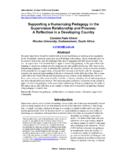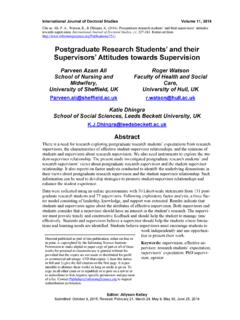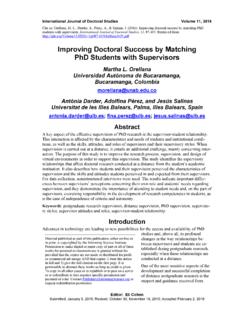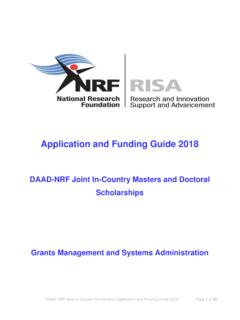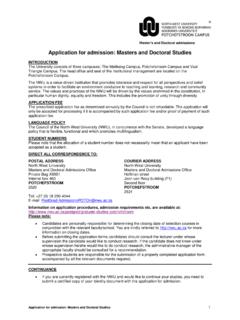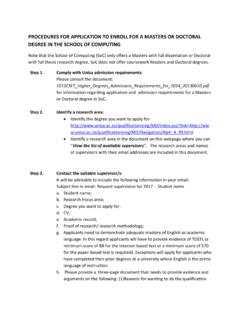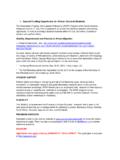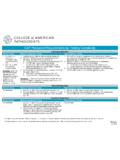Transcription of Motives and Aspirations for Doctoral Study: Career ...
1 International Journal of Doctoral Studies Volume 5, 2010 Editor: Nitza Geri Motives and Aspirations for Doctoral Study: Career , Personal, and Inter-personal Factors in the Decision to Embark on a History PhD Ian Brailsford Centre for Academic Development, University of Auckland, Auckland, New Zealand Abstract While extensive research exists for both the Doctoral experience and Career paths after the doctor-ate, less is known about the initial Motives for starting a PhD. In this study, 11 History PhD hold-ers from an Australasian university were interviewed about their reasons for embarking on the doctorate.
2 The Motives and Aspirations cited by the participants validate several of the categories identified in the limited existing literature, such as improving Career prospects, personal devel-opment, and intrinsic interest in their discipline. Moreover, the data support the contention that candidates enter the doctorate with multiple Motives . From this History sample, however, there were no overt Motives relating to the participants sense of their own identity and pressing social justice concerns or research as politics . The data reveal that third parties (friends, colleagues, family members, and academics) when consulted prior to enrolment did play a generally encour-aging role in the decision to start a doctorate.
3 A recommendation emanating from this research is that universities consider offering workshops for would-be candidates before enrolment so that initial Motives for Doctoral study can be explored and reflected upon before a candidate embarks. Keywords: Motives for Doctoral study; admission into Doctoral programmes; Doctoral advising; Doctoral supervision; graduate recruitment. Introduction Why would a mature person decide to do a PhD? It is not urban myth that a significant number of Doctoral students fail in completing their degrees, nor is the stereotype of the lonely dissertation student toiling away for years and years to finally stagger over the finishing line, exhausted and disillusioned.
4 There is a body of quantitative and qualitative research proving that deciding to do a PhD is a high-risk strategy (Golde, 2005; Lovitts, 2001; Powell & Green, 2007). Why would someone commit several years of his or her life studying for a degree when there was no guaran-tee of success at the end? These were the questions posed in this study to 11 individuals in Australasia who took up the challenge of a History doctorate; their answers provide, from a student perspective, qualitative data to better understand the complex decision-making process. Researchers have explored how Doctoral students navigate stages (Grover, 2007) of their candidacy, with special Material published as part of this publication, either on-line or in print, is copyrighted by the Informing Science Institute.
5 Permission to make digital or paper copy of part or all of these works for personal or classroom use is granted without fee provided that the copies are not made or distributed for profit or commercial advantage AND that copies 1) bear this notice in full and 2) give the full citation on the first page. It is per-missible to abstract these works so long as credit is given. To copy in all other cases or to republish or to post on a server or to redistribute to lists requires specific permission and payment of a fee. Contact to request redistribution permission. Motives and Aspirations for Doctoral Study 16 concern over student isolation as a cause of attrition in Doctoral programmes (Ali & Kohun, 2007; Lovitts, 2008).
6 Successfully embedding or socialising Doctoral students within their departments has been identified as a key factor in supporting persistence (Austin, 2009). Major studies are also tracking candidates Career paths beyond the doctorate (Aanerud, Homer, Nerad, & Cerry, 2006; Denholm & Evans, 2009). While our knowledge of Doctoral students staying in and then exiting the ivory tower is advancing, less is known about the entering phase (Gill & Hoppe, 2009; Leo-nard, Becker, & Coate, 2005). This paper, therefore, deals with this less understood aspect of the doctorate: the initial journey taken by students to enrolment.
7 It takes its cue from Tatham and Denholm s provocative question in Supervising doctorates downunder: If a doctorate is the answer, then what was the question in relation to Career development? (Tatham & Denholm, 2007, p. 262) This study is premised on the conjecture that PhD candidates (and their academic institutions) might avoid (or at least alle-viate) the difficulties that the existing research indicates are likely to be encountered during the doctorate if both parties clearly understand the candidate s Motives and Aspirations from the out-set. There are a few British studies that touch upon the issue of initial motivation.
8 Salmon s (1992) Achieving a PhD interwove narratives of 10 mature social science candidates recounting their own Doctoral journeys in the late 1980s, several of whom were motivated by social justice con-cerns and their own sense of identity. From their discussions with successful candidates, Chur-chill and Sanders (2007) in Getting your PhD established five generic headings to categorise mo-tives or reasons for embarking on a PhD: Career development; lack of current job satisfaction; a personal agenda; research as politics; and drifting in. Leonard, Becker and Coate s (2005) study, To prove myself at the highest level , using the Education doctorate as a case study, discerned from their interview data the powerful aspirational value of the doctorate (p.)
9 139). This desire of Education Doctoral holders to prove themselves underscored both personal growth and train-ing and qualification Motives . In addition to these British studies, a recent discussion on business professional doctorates (Gill & Hoppe, 2009, p. 31) proposes five motivational profiles (and an associated personal objec-tive) that could lead an individual to Doctoral study: traditional (entry into academia); advanced entry (professional development); continuing development (professional advancement); transi-tion (entry to a new Career ); and personal fulfilment (self-enhancement).
10 They also suggest that the first four profiles accord with different Career stages; traditional and advanced entry relate to early- Career candidates while continuing development and transition relate more to mid- to late- Career candidates. The final profile, personal fulfilment , could apply to individuals at dif-ferent stages of their Career . Finally, they note that more than one profile could motivate an indi-vidual candidate. The empirical research in this paper builds from these earlier studies explora-tory insights to better understand the Motives for Doctoral study and the decision-making process (such as seeking independent advice or exploring alternative options) using the History PhD as a case study.
